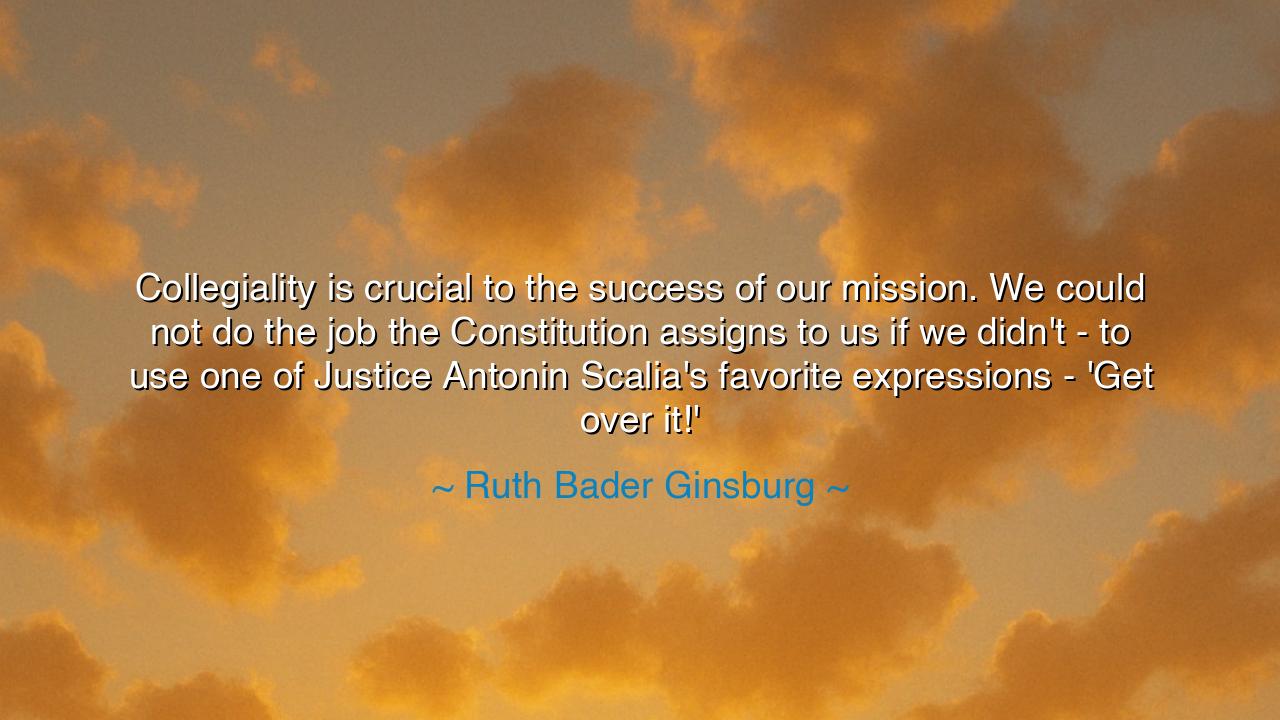
Collegiality is crucial to the success of our mission. We could
Collegiality is crucial to the success of our mission. We could not do the job the Constitution assigns to us if we didn't - to use one of Justice Antonin Scalia's favorite expressions - 'Get over it!'






Hear the solemn words of Ruth Bader Ginsburg, guardian of justice and servant of the Republic, who declared: “Collegiality is crucial to the success of our mission. We could not do the job the Constitution assigns to us if we didn’t—to use one of Justice Antonin Scalia’s favorite expressions—‘Get over it!’” In these words lies a truth both practical and eternal: that the work of justice, and indeed of any noble mission, cannot stand on pride, resentment, or division, but only on the strength of unity, respect, and the courage to move beyond personal grievance.
The ancients themselves proclaimed this wisdom. In the councils of Athens, orators would clash fiercely in debate, yet they knew that the survival of the polis depended on their ability to reconcile and act together once the vote was cast. To lose was bitter, yet the higher duty was to the city itself. So too in Rome, senators quarreled with thunderous words, yet the republic endured only so long as its leaders placed the Constitution of their state above their own wounded pride. Thus, Ginsburg’s words are not merely about judges on the bench, but about the eternal necessity of collegiality wherever human beings labor together for a higher cause.
Consider her reference to Justice Antonin Scalia, her ideological opposite and yet her dear friend. They clashed in philosophy, they sparred in opinion, and yet they laughed together, dined together, and cherished each other’s wit. For both understood: personal bitterness would poison the sacred duty of the Court. The phrase “Get over it!”—Scalia’s blunt wisdom—reminds us that in the service of a greater mission, one must not cling to wounded pride, but must rise above it. Thus, the friendship of Ginsburg and Scalia became a parable for all: that disagreement need not destroy respect, and rivalry need not quench affection.
The lesson is broader still. In every community, every workplace, every family, conflict is inevitable. Words may wound, visions may diverge, tempers may flare. But if each clings to injury, nothing endures. To honor the mission—whether of a nation, an institution, or a household—one must practice collegiality, the discipline of respect even amid discord. This is no small feat; it requires humility, patience, and the wisdom to remember that the cause is greater than the ego.
History teaches this again and again. When the American Revolution ended, thirteen states stood divided, quarreling over power and pride. The Constitutional Convention of 1787 was filled with conflict: Franklin, Hamilton, Madison, and others debated fiercely, their visions opposed. Yet they learned, in Ginsburg’s words, to “get over it,” forging compromise for the sake of the Union. Had they not, the republic would have perished before it began. Their collegiality was imperfect, but it gave birth to a nation.
Therefore, let us take practical wisdom from this teaching: When you disagree, do not linger in bitterness. When you are defeated, do not let pride become poison. Instead, practice the art of letting go. Say to yourself: “The mission is greater than my wound.” In your work, your friendships, your communities, remember that lasting success depends not on victory alone, but on unity of spirit. To “get over it” is not weakness—it is strength, the discipline of those who serve something greater than themselves.
So let the words of Ruth Bader Ginsburg echo as a command to future generations: collegiality is not courtesy alone—it is survival. Without it, nations fall, friendships shatter, missions fail. With it, even fierce rivals can build together. Let us walk in her wisdom, and when pride whispers to us to cling to offense, let us answer with Scalia’s thunder: “Get over it!” For only then will we rise to the height of our calling, and only then will our work endure.






AAdministratorAdministrator
Welcome, honored guests. Please leave a comment, we will respond soon